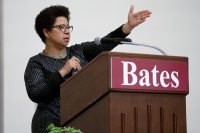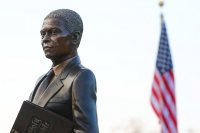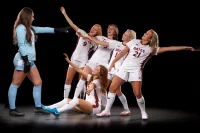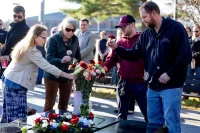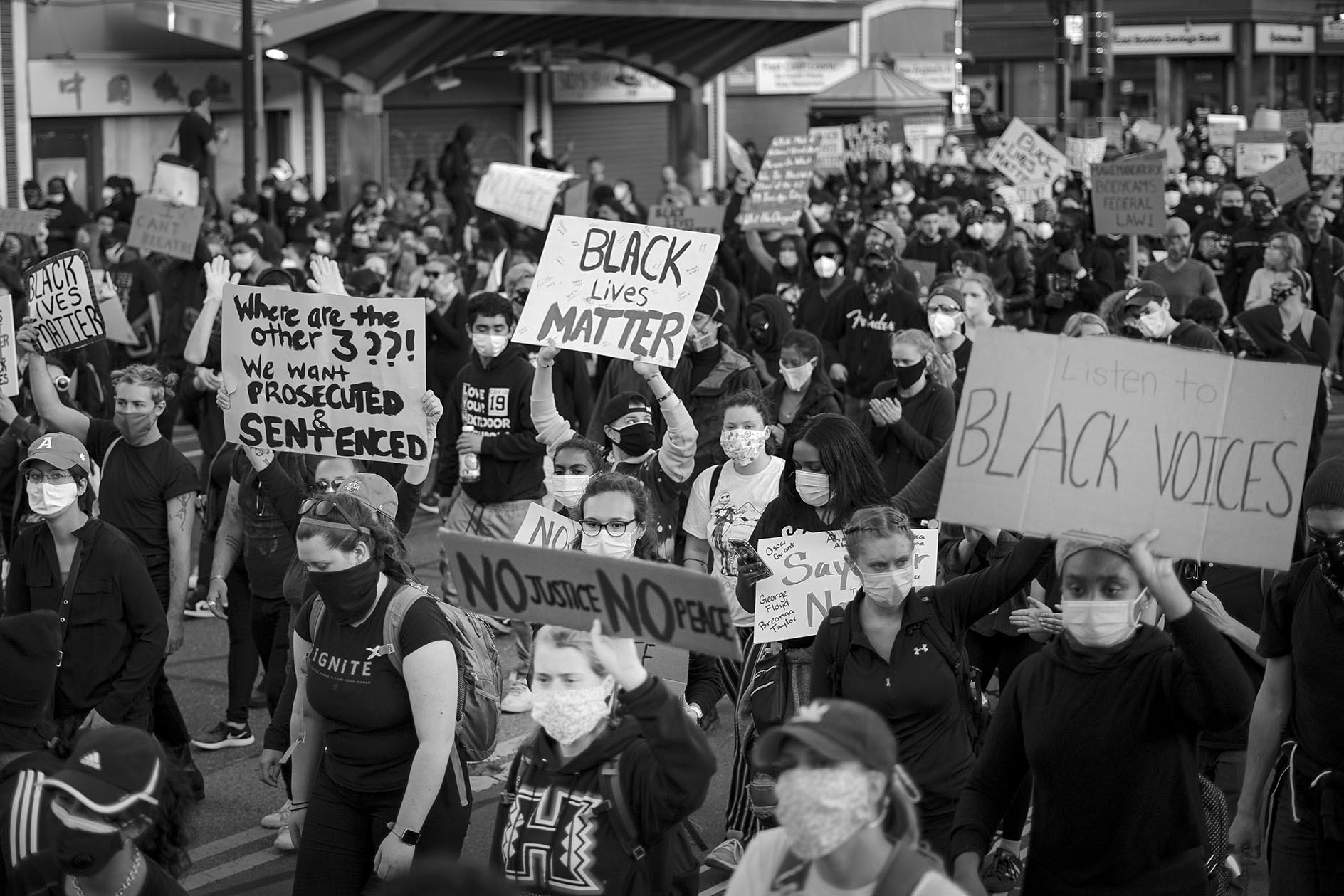
In one single year in the United States, “102 unarmed black men, women, and children were shot and killed by police in this country,” Shaun King told a Bates audience on Oct. 11.
The year was not during the violent depths of 20th-century Jim Crow racism, either. It was 2015.
And that number, 102, “is why they’re taking a knee,” said King, a journalist and justice activist.
King was referring, of course, to Colin Kaepernick and other athletes, including some at Bates and its NESCAC peers, inspired by the San Francisco 49ers quarterback to kneel, in protest against racial injustice, during the national anthem at the start of games.
Senior social justice writer for the New York Daily News and a leading voice in the Black Lives Matter movement, King spoke to a capacity audience in the Gomes Chapel, offering an overview, punctuated with penetrating detail, of the current fractured state of U.S. race relations.
A graduate of Morehouse College, King opened his talk with a few words about longtime Morehouse president and Bates graduate Benjamin E. Mays, Class of 1920. “At Morehouse, literally, he is like a god on our campus,” King said.
King described Mays as “probably one of the two or three most important people” in the life of Morehouse graduate and civil rights icon Martin Luther King Jr.
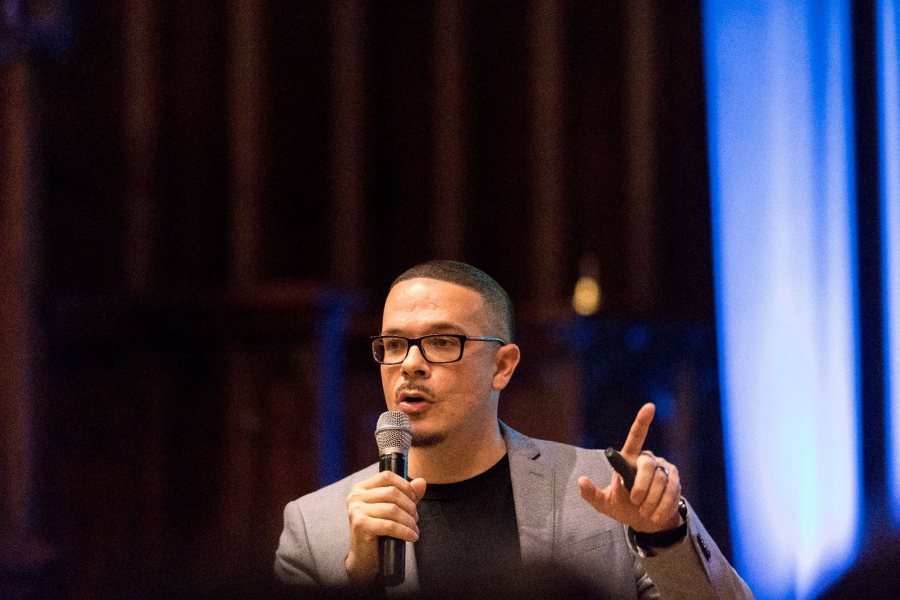
Black Lives Matter activist and New York Daily News justice writer Shaun King speaks in Gomes Chapel on Oct. 11, 2016. (Josh Kuckens/Bates College)
“When you think about the roots and the origins of the modern-day civil rights movement, you will always hear Dr. Mays’ voice, because he was the guy behind the scenes…that leaders were consistently going to” for guidance and validation.
“So Bates is tied up in that. And that’s a powerful thing, and I hope all of you understand, it should be a point of pride that Dr. Mays not only attended here, but was embraced and loved here. And so I’m honored to be here,” he said.
Central to King’s address was the idea that — despite great thinkers’ erstwhile belief that human morality was always improving — the quality of human behavior has its downs as well as its ups. And right now, America is living on the downhill slope.
As King put it, “We’re in a dip.”
He got this concept during the fall of 2014 — “a really pivotal time in my life” — when he and many other Americans were reeling from the summer’s spate of police shootings, many of which were caught on video. At the same time, King was suffering through an eminently droppable graduate-school course in historiography.
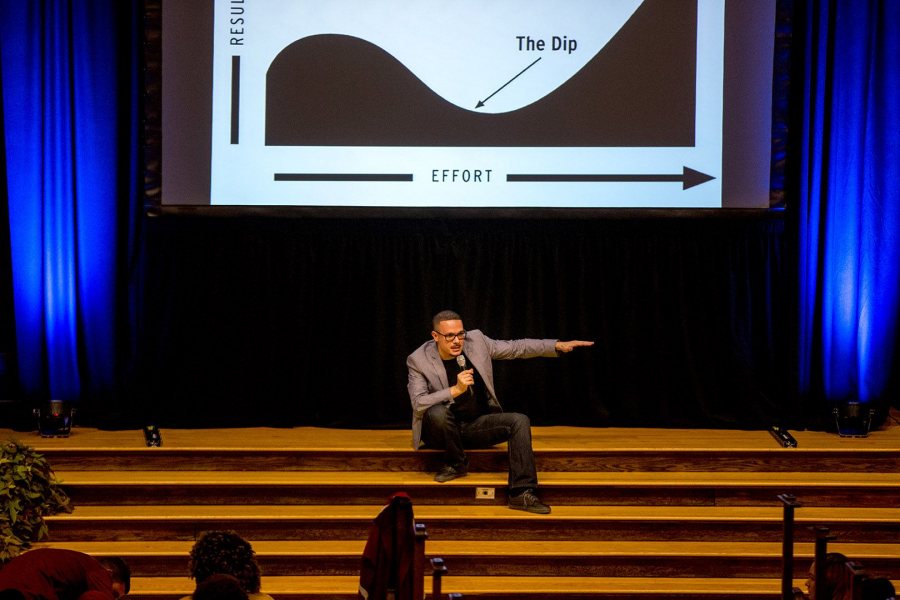
A theme central to racial justice activist Shaun King’s talk at Bates was that American society has lapsed into a “dip” in morality and behavior. (Phyllis Graber Jensen/Bates College)
But that course introduced him to Leopold von Ranke, a 19th-century scholar regarded as the father of modern historiography. Von Ranke discovered the variability in moral progress by creating a massive timeline of historic events and searching it for basic trends.
“Sometimes human beings are amazing, and sometimes they’re really terrible,” King said. “Sometimes the quality of humanity goes up, and sometimes it goes really far down.”
Moreover, it’s often hard to know where we are in the cycle: “When you wake up, brush your teeth, and get ready for class, you’re just thinking, ‘I want to be on time for class,'” King said. “You’re not thinking about the history of the moment.”
Supported by slides and video, King had plenty of evidence for the dip theory, from the advent of the trans-Atlantic slave trade to the Holocaust to the Rwandan genocide to the rise of Donald Trump.
He pointed out that the June 2015 killings of nine African Americans by a white man during a Bible study session in a church in Charleston, S.C., was the deadliest U.S. hate crime against blacks in at least 85 years.
And that massacre “took place on our watch last year,” King said.
He noted that in 1902 the number of lynchings of blacks also reached 102. “It jars me that we have to go back over 100 years to find a single year when as many African Americans were lynched as were shot and killed by police” in 2015.
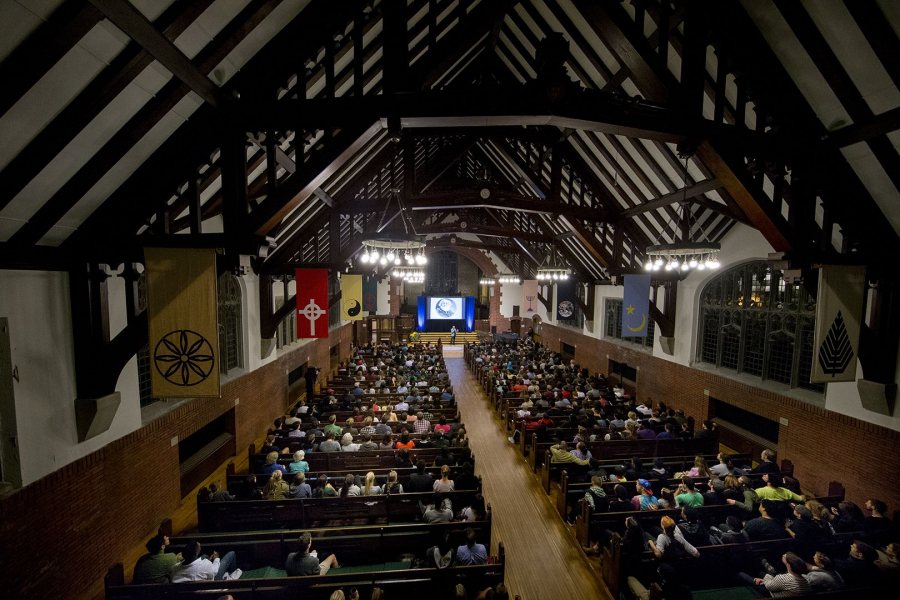
A rapt audience listens to racial justice activist Shaun King in the Gomes Chapel on Oct. 11, 2016. (Phyllis Graber Jensen/Bates College)
“I say that particularly — I say that with love — for the white folk in the room [who are] listening with love, who are having a hard time processing the anger, the frustration, the protests, having a hard time making sense of it,” said King.
“It’s disturbing. I’m not even saying that lynching and the killings by police are a one-to-one parallel, but they’re pretty close, and that we would have to go back to 1902 — it’s a problem.”
“This system was created to deliberately prosecute African Americans for low-level drug offenses and nonviolent offenses.”
Citing Douglas Blackmon’s book Slavery by Another Name, King talked at length about the perversion of the 13th Amendment to the Constitution. The amendment was originally intended to abolish slavery unconditionally, but was rewritten to accommodate slave labor for convicts.
This gave rise to new laws that essentially criminalized being black in order to ensure a steady labor supply in the prisons. That strategy took a new twist during the 1970s and 1980s with drug laws that ensured different standards of criminal justice for blacks and whites — leading to U.S. incarceration rates that are as much as 1,000 percent higher than other developed nations’.
“That there are stores where you can buy marijuana legally, and then my friend Brandon is serving a 10-year prison sentence [for marijuana possession] is ridiculous,” King said. “He’s serving a 10-year sentence because this system was created to deliberately prosecute African Americans for low-level drug offenses and nonviolent offenses.”
With a Q&A to follow, King closed his formal address with a look at The Atlantic Monthly‘s decision to endorse Hillary Clinton for president — only the third such endorsement in the magazine’s 159-year history. The others were for Abraham Lincoln and Lyndon Johnson.
“We have never found our way accidentally out of a dip in the quality of humanity.”
“I actually campaigned very heavily for Bernie Sanders and I’ve been a huge critic of Hillary Clinton,” King said, but he found himself “very moved” by The Atlantic‘s action.
What the endorsement says to King is that this dip that we’re in ranks in momentousness with only two other inflection points in American history: the outbreak of the Civil War in 1860; and, in 1964, a time of pivotal choice between civic progress and stability under Johnson, or the undoing of such progress under Barry Goldwater.
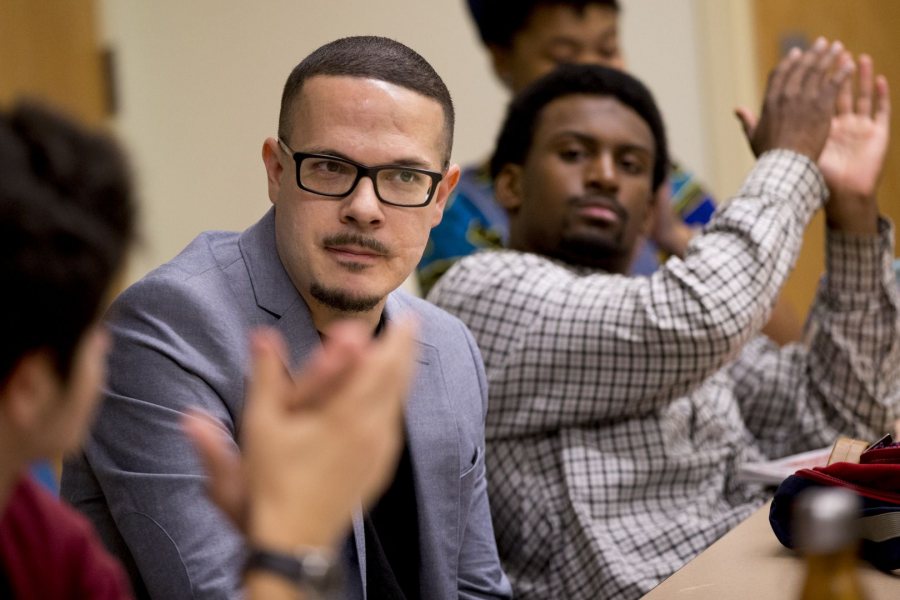
Prior to his evening talk, Shaun King visits the course “#blacklivesmatter,” taught by Yannick Marshall, a visiting instructor in African American studies. “When I speak at colleges, this is what I look forward to the most,” he said of meeting Bates students. “And this is one of the few Black Lives Matter classes in the country.” (Phyllis Graber Jensen/Bates College)
“Bigger than the endorsement is the realization that, OMG, we are living in one of those times,” King said. “And it made sense to me, deep in my soul, because many of us have felt like it was one of those times.
“What I want you to understand is, we will not get out of that dip by accident. We have never found our way accidentally out of a dip in the quality of humanity.”
He said, “It’s going to take enormous efforts, nationwide reforms, and, I’m very afraid, major sacrifices.”
The concluding Q&A was nearly as meaty as King’s formal address. Smart questioners gave him opportunities to discuss the financial motivations that drive a racist criminal justice system, such as the revenue from fines and bail that was so important to the municipal bottom line in Ferguson, Mo.; and to assess the accomplishments of Black Lives Matter.
Another questioner wondered how to best allocate one’s activist energy with so many social justice problems confronting us. King quoted Martin Luther King Jr.: “Injustice anywhere is a threat to justice everywhere.”
King allowed that “most of my life, I’ve only fought for issues that directly affected me and my circle. But for the past two or three years, I have tried to practice fighting against xenophobia and anti-Muslim sentiment in this country,” as well as LGBT rights, “even though it is not my life.”
He said, “For all of us in the room, there’s something really powerful about fighting for a problem you don’t have.”
Bates’ Office of Equity and Diversity brought King to campus with support from the Athletics department and the programs in African American studies and American Cultural studies.
